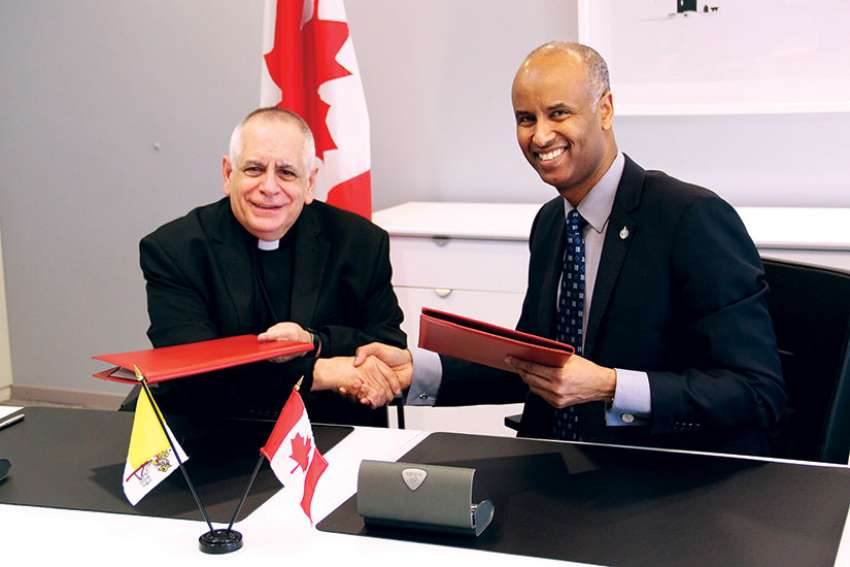Immigration, Refugee and Citizenship Minister Ahmed Hussen made the announcement in Geneva March 15 when he renewed an agreement between the Canadian government and the International Catholic Migration Commission. Under an agreement signed in 2013, Canadian funding has allowed the Catholic agency to interview and process 41,300 refugees.
“The money we’ve been getting from the Canadian government allows us to send more people,” ICMC general secretary Msgr. Bob Vitillo told The Catholic Register by phone from Geneva. “It’s been a big help to us.”
The money will fund ICMC operations through to March 2018. In total, Ottawa’s funding for ICMC has come to $6.8 million over five years, enough to deploy 88 resettlement experts in the field.
The ICMC works closely with the United Nations High Commissioner for Refugees, sending specialized staff into refugee emergencies to conduct interviews and assess refugees for resettlement programs around the world.
“Certainly some of the people we’ve interviewed did go to Canada, especially given the very generous and creative resettlement policies that you have in Canada now,” Vitillo said.
One of the areas ICMC staff specialize in is identifying and assessing child refugees, many of them travelling on their own. In some cases they are able to reunite separated children with their families. In other cases the task is to separate vulnerable children from predators.
“We really need to listen very carefully to these children and be sure that we’re protecting their best interest,” said Vitillo.
Vitillo is particularly grateful that the Canadian money comes without restrictions.
“They didn’t say you have to only send people who are going to do this, or you have to only send people whom we are considering for resettlement. They really allow us to be able to respond to the UNHCR’s needs and to be able to do it in a very flexible way,” Vitillo said. “It’s Canada’s contribution to the needs of the whole international community.”
The ICMC’s annual budget in 2015 was $46.5 million, about three-quarters of it coming from the UNHCR and United States government agencies.
The ICMC was set up in 1951 by Pope Pius XII in response to the enormous flows of refugees through Europe in the aftermath of the Second World War. In the late 1950s, with Msgr. Giovanni Battista Monti (the future Pope Paul VI) at the helm, the ICMC soon found itself dealing with people escaping through the Iron Curtain to the West.
By the late 1970s the Catholic organization found itself on the front lines, sorting Vietnamese boat people for resettlement in Canada and the United States. As Yugoslavia broke down it worked with Bosnian Muslims. It was on the scene in 2004 after the tsunami wiped out coastal communities in Indonesia. ICMC has been helping Iraqi refugees in Damascus and Beirut since the U.S. invasion in 2003 and today it works with Syrians throughout the region.
“We have special status with the Vatican, but we’re also a professional organization,” Vitillo said. “We abide by all the professional standards. We’re well administered, managed and monitored. But also, we do this because of our faith — even though many of our employees are not Catholic or Christian, and certainly probably the majority of the people we are serving would not be Catholic or Christian — but we do it because we’re Catholic. It’s in the very DNA of the Church to do this.”


